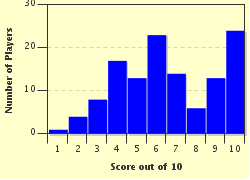Quiz Answer Key and Fun Facts
1. The first mention of rain in the Hebrew Bible and the English Bible is found in Genesis 2:5. However, before rain started falling on the earth, Verse 6, in the NKJV, states "a mist went up from the earth and watered the whole face of the ground."
2. Scripture tells of rain falling continuously on the earth for forty days and forty nights with the entire earth becoming engulfed in a massive flood. According to Genesis 7:24, in the NKJV, how many days did the floodwater 'prevail' on the earth?
3. In addition to describing Canaan as "a land of milk and honey," Deuteronomy 11 describes it as "a land of hills and valleys, which drinks water from the rain of heaven."
4. Scripture tells of a leader of the Israelites being angered by their decision to have a king rule over them. According to Scripture, the leader stressed to the Israelites it was imperative they continued following the commands of the LORD, or there would be dire consequences. To prove his point, Scripture says the leader vowed he would call on the LORD to "send thunder and rain, that you may perceive and see that your wickedness is great." What was the name of the man?
5. 2 Samuel 21:10 tells of a concubine of Saul tenderly watching over the corpses of her sons, protecting them from birds and animals. Scripture also states the solemn vigil took place "from the beginning of harvest until the late rains poured on them from heaven." What was the name of the devoted woman?
6. According to 1 Kings 17:1, a prophet of God proclaimed to King Ahab there would not be dew or rain, "except at my command." Who was the plucky prophet who rained on Ahab's parade?
7. According to Proverbs 27:15 in the NKJV, a continual dripping on a very rainy day is akin to _________?
8. In Matthew 7:24-27, Jesus tells a parable in which "the rain descended, the floods came, and the winds blew and beat" on a house but it did not fall. According to Jesus, why did the house not fall?
9. Acts 28:2 tells of the survivors of a shipwreck gathering around a fire on Malta to keep warm while rain was falling. What were the names of two of the survivors?
10. Revelation 11:6 tells of a vision by John of Patmos involving "two witnesses." The verse states the witnesses "have power to shut heaven, so that no rain falls in the days of their prophecy; and they have power over waters to turn them to blood, and to strike the earth with all plagues, as often as they desire." How are the two witnesses described, as per Revelation 11:4?
Source: Author
Cowrofl
This quiz was reviewed by FunTrivia editor
CellarDoor before going online.
Any errors found in FunTrivia content are routinely corrected through our feedback system.

